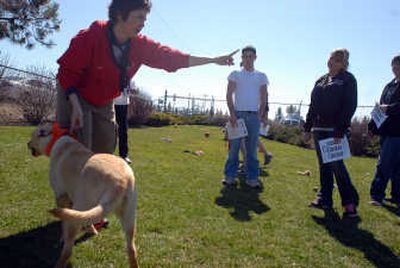Color-coded matchmaking

There’s an age-old joke that, over time, dogs and their owners grow to look and act alike. It’s no surprise. Invest any relationship with unconditional love, loyalty and devotion and that result would be inevitable.
But how do you go about predicting relationships?
It’s hard enough when both parties speak the same language. When one can only bark and wag its tail, it gets more difficult.
The Spokane County Regional Animal Protection Service has adopted a new program developed by the national American Society for the Prevention of Cruelty to Animals, the ASPCA, called Meet Your Match.
Finding the right canine match is now as easy as matching colors.
“This has been a great new program – it helps people find the right companion right off the bat,” SCRAPS program coordinator Patricia Simonet said. “What makes it even more exciting is the fact that both SpokAnimal and the Spokane Humane Society have also instituted the program. You can come here, take the survey, and if you don’t find an animal that matches you here, you can take your match card to either of those two other shelters.
“We’re just now starting to do the same program with cats in this shelter.”
SCRAPS took in more than 6,700 dogs and cats in 2007. Only 1,522 of those animals were adopted. Another 1,185 were returned to their owner and 1,350 were transferred to other organizations. The bottom line is that 2,533 lost or abandoned dogs and cats were euthanized last year.
Nationally, Spokane is the first metropolitan area to fully adopt the new program, Simonet said, and SCRAPS is actively urging shelters in North Idaho to enroll in the program as well.
The Meet Your Match program tests both animal and prospective owner.
Adopters fill out an 18-question survey that reveals what they are looking for in their new companion – whether or not there are small children or other animals in the home, if they’re looking for an outdoor playmate or an indoor companion.
Dogs go through two separate sets of tests. The first, called the SAFER (Safety Assessment For Evaluating Rehoming) certification, tests the dogs for potential aggression.
“We assess the dogs when they first come in,” trainer Lori McCallister said. “If they aren’t SAFER-certified, they don’t go into the program. Every dog that has an MYM tag has been certified.”
SCRAPS volunteers administer the Canine-ality tests, determining each dog’s personality, breaking them down into nine categories and three color categories.
“In some ways, the volunteers get the fun stuff to do,” Simonet said. “They take the dogs out and play with them and get to know them and what they need. They check the dog to see how they’re going to act when they’re left alone and how they’re going to greet you when you get home.”
Volunteers frequently forge bonds with the dogs they test, Simonet said. Because SCRAPS is a municipal shelter, there will always be cases of dogs that do not find new homes and are euthanized.
“When a volunteer comes in and sees an empty cage where a dog they were working with used to be, it can be heartbreaking,” she said. “I try to be out there when I can to tell them when a dog is gone because it was adopted. That’s a much happier ending.”
Nationwide, there are fewer than 50 accredited trainers through the MYM program. Three work through SCRAPS.
Kathy Keeney and McCallister both are certified dog trainers and certified through the MYM program. Both are dedicated to finding homes for deserving animals.
“Whatever we can do to make it easier to match these dogs with a loving home where they can be happy and the owners can be happy, that’s a win,” McCallister said.
Kenney said she found her canine soul-mate through SCRAPS. Her Australian shepherd, Notch, is a constant companion who doubles as an assistant assessor.
“We have two dogs that help us with the assessment,” she said. “Notch is our test dog. He helps us test how dogs react to having another dog in their space. He’s also a great judge of character and we really trust him. If Notch doesn’t like a dog or doesn’t want to have anything to do with a new dog, we take that very seriously.”
Draco, a large Rotteweiler, helps with assessment, but has a specialty.
“Draco also helps us train puppies,” McCallister said. “If puppies don’t have good manners with older dogs, if they aren’t respectful or are obnoxious, he puts a big, old playful paw on them. He’s gentle with them, but they learn in a hurry. We call it Puppy Smashing.”